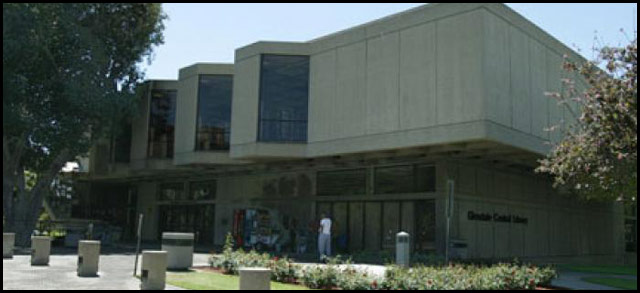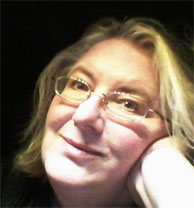(Originally posted on LiveJournal)
So yesterday, I went to the monthly gathering of the Alameda Writers Group (held at the Glendale Library). Their speaker was addressing how to strategize and plan one’s career plans for the year. It was something I could use a refresher course on, so that was good.

Glendale Public Library
In the hob-nobbing time before they settled down for the speaker, I was chatting with one woman about a project of hers. The gist of it was that she wanted to do a history of an event she’s been involved with. But she didn’t want it to be dry and boring, so she cast it in a story set 10 years (or so) in the future, and the main character is doing research on the event, trying to sort the facts from the “urban myths” of it.
I thought this was a quite innovative way of addressing the narration, but observed that it would probably make booksellers and librarians a bit nuts. What do you call it? Where do you shelve it?
It led me to thinking about books recently that have gotten into major trouble for being fictionalized “true stories”. If the book was good to start with, should the fact that it wasn’t totally non-fiction destroy its credibility as a piece of writing? Surely we could come up with a label that would flag these things in an easily grasped way.
What popped in my head was the term “fictive non-fiction”.
For that grey area between flat-out fiction and absolute factual non-fiction.
Because I do think that some times for a storyteller, the “real truth” does not make the point you want to convey. So to convey the truthful meaning a touch of fiction is needed to season the prose. I do think that all authors should be honest about when this is being done, though. I don’t think we should ever pass off as the “full real truth” things we know are not so. We should not bow to the pressure of marketing departments when they say “Oh, it’ll be better to present it as all fact! Nobody will know the difference!” In this day and age, it is easier than ever to suss out the fictions in “real truth” memoires and such.
I’m curious: do others think this could become a viable genre? What would you think if you found something labeled “fictive non-fiction”?
Comments
kalimac – Jan. 5th, 2009
It’s probably a good thing I never had to catalog a copy of Edmund Morris’s Dutch, because I would have cataloged and classed it as a novel.
Actually, this isn’t a new problem. I’ve seen a 1950s series of children’s books about various scientific and engineering careers. (Several of them were written by Julian May.) They’re in the form of thinly-plotted novels about kids interested in these careers who have great wads of factual expository lumps dumped at them. LC had no trouble classifying them as non-fiction.
scribblerworks – Jan. 5th, 2009
Intersting. I had the vague feeling it was not that new an approach (I did fleetingly consider the “educating the young through stories” bit).
I do think we could do with more public discussion of the form, though.
godswraith – Jan. 5th, 2009
Fictive non-fiction has a better ring than Lies Based On Truth. 🙂
scribblerworks – Jan. 5th, 2009
Oh, definitely! Heh.
sartorias – Jan. 5th, 2009
This isn’t new–fictional memoirs are a subgenre, as have been fictionalized history clear back since before Jane Austen made fun of them in Northanger and in Persuasion.
hand2hand – Jan. 5th, 2009
What about creative nonfiction? Wouldn’t that be very similar to what you’re talking about?
A great example of dramatized real history is “The Killer Angels” about the battle of Gettysburg.
“Dutch”, unfortunately, just made me mad.
Also apparently people are comfortable with memoir as a genre being “not quite accurate or even true.” poetic license, poetic truth and all that. Mark Doty wrote about that recently in, i believe, Writers & Poets magazine?
scribblerworks – Jan. 5th, 2009
Speaking for myself, I don’t find the term “creative non-fiction” at all helpful in the matter of gaging whether or not parts have been fictionalized.
But, having looked up some uses of it, yes, my term could be applied to such things.
But I would contest the accuracy of your last statment there, regarding the acceptability or “comfortableness” with which fictive memoirs are being received. The reactions to the revelation that Frey’s A Million Little Pieces was largely fictive (even if based on some of his own experiences) would indicate that there is a high expectation that memoirs will not be fictive.
It’s a fine line to tread, I think. I really suspect that if Frey had presented his book not as true facts about his own life, but a fictive rendering of things he and others had experienced, he would not have gotten into the trouble he did.
hand2hand – Jan. 6th, 2009
Indeed; the Frey thing and “Midnight in the Garden of Good and Evil“, back in the day, and of course “Dutch” show how no one can really agree on where the boundaries lie.
My training was in journalism, so I kind of take a very strict view of the line between fiction and nonfiction, but I’ve learned that opinions among English scholars and writers do vary.
Memoir seems particularly sticky and full of disagreement on what is acceptable.
I was at a memoir writing workshop once where the instructor said conflating characters and making up dialog was okay. I boggled. But again: my training was different.


